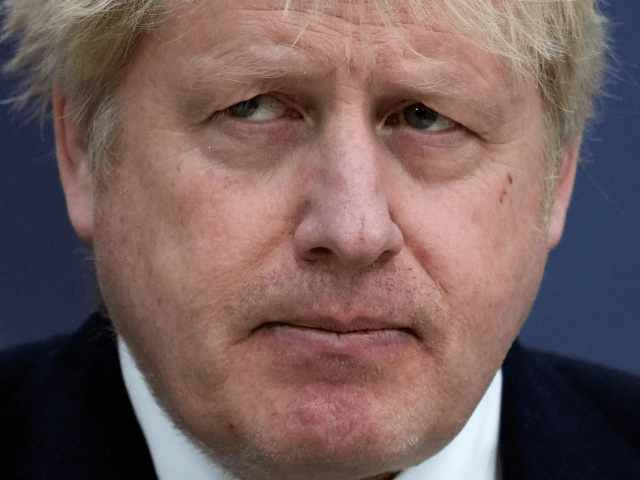Boris Johnson’s post-Brexit immigration scheme has resulted in a massive upswing in immigration from Africa and Asia, while the number of migrants from the European Union declined.
Rather than fulfilling the desire of Brexit voters to reduce immigration to the UK, the number of work visas granted to migrants last year increased by 25 per cent over to the pre-Brexit and pre-pandemic year of 2019.
Prime Minister Boris Johnson’s liberal points-based system has come with it a steep rise in migrant workers from Africa, India, and the Philippines and a decrease of migration from the European Union, according to Home Office figures obtained by The Times of London.
The paper of record reported that 239,987 work-related visas were granted in 2021, only ten per cent of which were afforded to workers from the EU. The Home Office figures show an increase of over twenty per cent in migrants from outside the EU reaching Britain after obtaining the updated skilled worker visas introduced by Johnson’s government.
The Skilled Worker Route, which came into effect in January of last year, has removed many regulations involved for foreign workers to come to the UK, including scrapping the requirement for British businesses to provide proof that they could not find a native worker to fill a position before looking to outside the country.
The post-Brexit law also increased the number of professions considered to be “skilled” to include jobs such as bricklayers, chefs, electricians, healthcare workers, and welders.
‘Give British Workers a Chance!’ Think Tank Bashes Plan to Import Millions of Workers During Economic Crisis https://t.co/mlrb6mZRR9
— Breitbart London (@BreitbartLondon) October 1, 2020
To add insult to injury to British workers, the Johnson government also removed the caps on most visa routes, meaning that there is effectively no limit on the number of migrants who can come to the country. According to The Times, the points-based immigration system has so far opened up half of all jobs in the UK to foreign competition through the lowering of salary and skill standards for foreigners.
Broken down by nationality, migrants from Nigeria represented the largest increase of skilled worker visas granted over 2019, surging by 161 per cent from 3,918 to 10,245 in 2021. Migrant workers from Pakistan rose by over two thirds, and Filipinos increased by over 50 per cent during the same time period.
Overall, Indians were granted the most skilled worker visas, receiving 67,839 last year, a 14 per cent increase over 2019.
Migrants from the Americas did actually decline, with a fall of about a quarter due in large part to Chinese coronavirus restrictions.
Commenting on the massive increase in non-EU migrants, professor of economics at King’s College London, Jonathan Portes said: “There was always this question about whether Brexit would result in a reduction in immigration or a switch or some combination of the two.
“The original Theresa May plan was very much aimed at the former — at reducing immigration from the EU by ending free movement, while having only very limited increases in non-EU migration.
“The system we have ended up implementing is much more about the switch rather than the reduction because the new system is considerably less liberal for Europeans because the end of free movement but it’s considerably more liberal on a number of dimensions for the non-EU for both work and student visas.”
Stop Mass Migration or Britain Will Face Societal Breakdown: Report https://t.co/CK73bD7RX5
— Breitbart London (@BreitbartLondon) August 24, 2021
While the points-based system was said to be inspired by the Australian model of immigration, the Johnson government refused to put in place any hard caps on the number of migrants allowed into the country, which some, including the Migration Watch UK think tank, have long-warned would fail to deliver on the Brexit promise of reduced immigration.
Speaking to Breitbart London in 2019, Alp Mehmet, the chairman of Migration Watch, said that the Tory Party claim that the system would reduce immigration was “nonsense”, saying that “it’s going to do no such thing. Unless they intend to include the sort of elements in the system that will reduce numbers and that’s having caps.”
“A cap on the number of workers coming in. The Australians have it, why not we… if we are going to introduce that sort of system?” Mehmet questioned at the time.
The Conservative Party has long pledged to cut net migration from “the hundreds of thousands to the tens of thousands,” making the promise to the public prior to the 2010, 2015, and 2017 general elections. However, this was never fulfilled.
In a revealing statement in 2017, the former Chancellor of the Exchequer George Osborne admitted that the Tory Party never actually intended to cut migration, saying that despite their promises to the public, they were never in favour of “the pledge in private and all would be glad to see the back of [it]” and added that the party could have reduced non-EU based immigration but refused to.
UK Ethnic Minority Population Has Doubled to 13m, Over One-Fifth of General Pop: Report https://t.co/NExNb5DnBx
— Breitbart London (@BreitbartLondon) July 27, 2021
Follow Kurt Zindulka on Twitter here @KurtZindulka

COMMENTS
Please let us know if you're having issues with commenting.